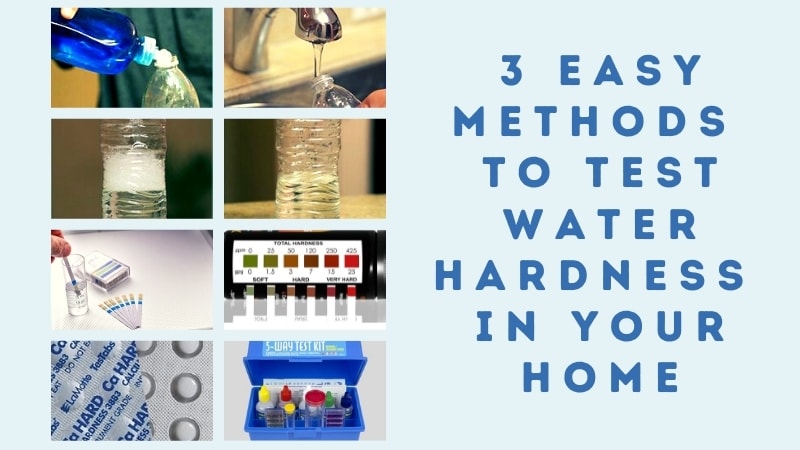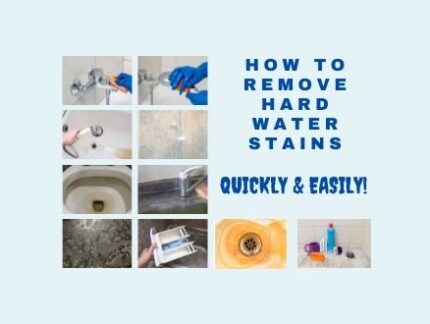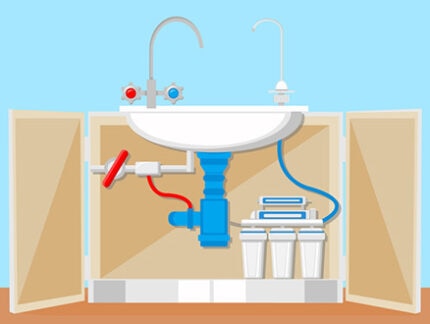Hard Water is a common issue that affects many households. It causes several unpleasant conditions such as; itchy skin, dirty clothing, damage to household appliances, etc. If you have observed the signs of hard water in your home, your next step is to solve the problem. However, you need to know how to test water hardness before you can get rid of it.
While it may not pose any major risks, living with hard water in your house can be ruthless. Luckily, once you find out that you have a hard water problem, solving it is easy. In this article, you’ll learn how to test and measure water hardness. You’ll also learn how to interpret your test results and effectively solve your hard water problems.

How is Hardness in Water Measured
“Hardness” in water occurs as a result of high mineral content in the water. There are variations in the level of hardness in water, and measuring shows you how hard your water is.
Grains per gallon is one of the most common measurements used. Still, some laboratories use parts per million or milligrams per liter (mg/L).
1 grain per gallon (GPG) equals 17.1 part per million (PPM).
Tips
- To convert a hardness level measured in mg/L or ppm to grains per gallon, just divide the total hardness level by 17.1 to get grain per gallon hardness.
How to Interpret Your Hard Water Test Results
| Classification of water | Grains per gallon (gpg) | Milligrams per litre (mg/L) or Parts per million (ppm) |
| Soft | 0 – 1 | 0 – 17.1 |
| Slightly hard | 1 – 3.5 | 17.1 – 60 |
| Moderately hard | 3.5 – 7.0 | 61 – 120 |
| Hard | 7.0 – 10.5 | 121 – 180 |
| Very hard | 10.5+ | 180+ |
The table above shows the standard scale used according to the US geological survey to determine the hardness of the water. Note the value of calcium carbonate in your test result and use the above table to interpret it. A calcium carbonate value that falls below 1gpg is classified as soft water.
When the value of calcium carbonate is above 10.5gpg or 180mg/L, the water is hard.
How to Test Water Hardness
There are several methods on how to test water hardness. You may prefer to do a simple soap test, purchase a test kit or call in a professional. It all depends on your preferred choice and how much you’re willing to spend or save.
1. Soapsuds Test (Step-by-step)
This method is used to test for hardness quickly at home. You don’t have to purchase anything, and all the tools you’ll need are already available at home. The list of things you’ll need include;
- Empty clear bottle
- Soap
- Water
Step 1 – Pour Some Water into the Bottle
Fill one-third of your bottle with water. You should make sure that your bottle has a cap and can also hold at least 360 mL of liquid. It’s also essential that you use a clean bottle.
If you don’t have a cap for your bottle, you can use any clear container, e.g., a glass cup.
Step 2 – Add Liquid soap
Add ten small drops of liquid soap into the bottle and shake it hard. If you are using a container without a lid, stir the water with a stick until the soap completely dissolves.
Step 3 – Search for Soap Suds
After you have properly mixed the soap, you need to look for suds. If there are plenty of suds at the top of the bottle, it means you have soft water.
However, if there are only a few soap suds, you need to add more soap until you get a lot of bubbles. 30 drops of soap mean that you have moderately hard water, while 50+ or more drops indicate very hard water.
Tip:
Tips
- Use a true (Castile) soap for this test. A true soap causes the mineral water to precipitate out, and detergent won’t work!
2. Water Hardness Test Kits (DIY)
For a more precise test, you can use any water hardness kit. You purchase one online or from local stores at a small cost. Three different types of hard water test kits include;
- Test strip – The test strips usually come with a color chart showing the classification of water hardness. Fill a glass with some water, place the test strip in it and wait for a minute. When the strip’s color changes, consult the color chart. Match the color on your strip with the chart to determine water hardness.
- Titration kit – This kit includes a chemical you will use to test the water. Fill a bottle with water, then drop some chemicals into it. The color of the water will change at once if it is soft. However, the more drops you need to change the color increases the hardness level.
- Digital-hardness-tester – This equipment is more technical and is more complicated to use. However, it comes with an instruction manual. It’s also more expensive than other test kits.
Tips
- If you manage an aquarium or pool, this test kit will come in very handy.
3. Professional Alternatives
Perhaps the most effective approach to conduct a hard water test is to contact a professional.
You can call your local water provider to send you the report of their water quality. Also search their website – you may even find the report online.
Alternatively, Find a water-softener company near you to test your water and install a water softener for you.
Although it’s also quite expensive, you’ll get a more accurate result if you send a sample of your water to an independent laboratory. The lab will test your water and send you the result after the test is complete.
Warning
- Water coming from the municipal supply usually gets contaminated once it leaves the station. Therefore, reports from your local water provider do not reflect the actual quality of your water.
How to Treat Hard Water Effectively
Hard water is not permanent and can be treated with water softeners: salt-based softeners and salt-free alternatives.
Salt-based softeners use sodium ions to replace the minerals in hard water. They require electricity and produce wastewater. You’ll also need to regularly charge the system with salt.
Salt-free softeners can be used as an alternative. The hard mineral in the water is changed into a crystal until it can’t stick to any surface. Unlike salt-based softeners, salt-free methods are environmentally friendly and do not require electricity. They also do not produce wastewater. However, these alternatives aren’t as effective as salt-based water softeners. You can consult a professional to help you decide which softener is best for you.
Warning
- Salt-based softeners can be very dangerous for people who require a low sodium diet.
How To Measure Hardness in Water Softener with Test Tablets
To check if your water softener is working, you can measure the hardness with a test tablet. Fill 10mL of water from the softener into a plastic bottle.
Add one Yes/No test tablet into the water and shake vigorously until the color changes. The hardness level is below 20mg/L if the color is green, indicating soft water. If it is red, then the hardness level is above 20ppm.
Warning
- Do not touch the test tablets with your bare hands! If this happens, wash your hands immediately and thoroughly.
Conclusion
It is challenging to solve hard water problems without first learning how to test water hardness and hard water measurement. However, with all the information you now have, you can improve your living conditions by having a hard water-free household.










